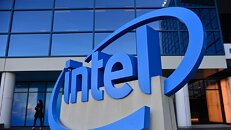Tuesday, March 2nd 2021

Intel Fined 2 Billion USD In Damages For Patent Infringement
A federal jury in Texas has ruled that Intel Corporation violated two patents of VLSI Technology and must pay 2.18 billion USD in damages. The damages include 1.5 billion for one patent and 675 million for the other. The patents are related to clock frequency control and minimum memory operating voltage technique and were awarded to Freescale Semiconductor Inc in 2012 and SigmaTel in 2010. Freescale bought SigmaTel gaining control of the two patents before being passed to NXP after the company acquired Freescale in 2015, these patents were then transferred to the newly resurrected VLSI Technology in 2019 with the sole purpose of launching a legal battle against Intel. In a comment to Tom's Hardware the company said "Intel strongly disagrees with today's jury verdict. We intend to appeal and are confident that we will prevail.". This legal battle will likely drag-out for several years as Intel plans to appeal the recent ruling. Intel recorded a net income of 5.9 billion USD in Q4 2020 so this fine is by no means insignificant.
Source:
Seeking Alpha

62 Comments on Intel Fined 2 Billion USD In Damages For Patent Infringement
Here's the link for the initial complaint filed by VLSI:
→ www.courtlistener.com/docket/14917461/1/vlsi-technology-llc-v-intel-corporation/
Of course, due to the nature of the matter of it, it's highly technical and cryptic in layman's terms. Though I take it that it's a solid non-issue for y'all freaks here.
There are essentially 3 patents in question here already. Shamelessly stealing here from /u/CyberpunkDre (kudos chap!);
Mind you, each claim starts and ends with standard legal jargon but the middle of each has inserts of Intel presentations on the "infringing" technology and how VLSI alleges that the named technology is what is described in the patent.
Intel products that use dynamic cache shrink technology in an infringing manner.
Link to the patent in question: → patents.google.com/patent/US8156357B2/en
Intel products that use fuses or other non-volatile memory to store information about SRAM minimum voltages in an infringing manner.
Link to the patent in question: → patents.google.com/patent/US7523373B2/en
Intel products that use infringing Hardware-Controlled Performance States (“HWP” or “Speed Shift”) technology
Link to the patent in question: → patents.google.com/patent/US7725759B2/en
rogueruthless big business.Since if the past has shown anything on lawsuits, it's that most accused ones were always quick to blame the other side of the same – when in fact the initially accused one was to blame and actually violated given patents being claimed having violated. Care for an example?
Just take Qualcomm vs Apple – and how Apple's sole intention was, to harm Qualcomm's business from the get-go already years in advance prior to any law-suits, how they gave away Qualcomm's confidential IP they have been granted in confidence to Intel (so that Intel could build their own modems using Qualcomm's technology) and whatnot.
'Member how Intel was recently sued by the well-reknown Chinese Academy of Science for violating their patents on FinFets, and how they only asked for $ 28 million (yes, you read rightly; only 0.028 billion for violating the most crucial bunch of patents of today's underlying chip-technology) to solve the issue altogether forever? You know what happened instead? Intel went on to try get all of the disputed patents being recognised as invalid. So the pretty legitimate question remains on the given »… but why, Intel?!«.
The question remains, when it isn't that much and can be considered peanuts already for Intel (no doubt about it; they likely pay even more for post-stamps per year already), then why on earth is it that Intel has tried various attempts in getting said patents in question being disputed and recognised as being invalid.So in other words, Intel has tried several times, in the U.S. and China, to recognise the patents in questions as being invalidated. All of those filings for action for annulment and nullity suits (in favour of Intel) were rejected nonetheless (to the detriment of Intel itself), several times in a row – even by the U.S. Patent and Trademark Office itself. Doesn't that speak a lot for itself already, that there are in fact valid accusations towards Intel of IP-theft?
The answer is: Since they know they did so and were actually accused rightfully and do everything in their power for not being possibly held accountable, if such cases of accusations could turn out to be
trueconfirmed to be actual truth in court in the first place.When even the U.S. itself wants to recognise given claims of Intel and outright denied them the favour of annulments. … and that was already when our all saviour bold perm was still in charge, midn you.
Sadly, Intel has a history of intellectual property thefts. Bigger examples are Intergraph (twice!) and a multi-billion settlement with then Digital Equipment Corporation (wonder how Intel regained the performance crown and kept it for so long?). Ever heard of Cyrix and how Intel stole a shipload of their technology on energy-saving mechanism? We could go on for hours, you got the idea.
… and just between ourselves, tech-geeks these days; If anyone needs to be explained who's likely the one having violated patents when the accusant in question is of all things VLSI Technology (one of the hatcheries of the silicon industry on ASIC-logics and whatnot), than people in question need to be beaten with Smith's ›An Inquiry into the Nature and Causes of the Wealth of Nations‹ and Keynes' ›The General Theory of Employment, Interest and Money‹, and hopefully slapped with Wooldridge & Greenspan's ›Capitalism in America: A History‹ afterwards – especially if the accused one is once more Intel.
That being said, given Intel's past, it's pretty save to assume that Intel is rightfully accused here (once more). Point's made.
This company has invalidated every single benefit of doubt for every given future – by their countless shady and straight-out harmful to evil anti-competitive actions.
When it comes to the billions of transistors in a CPU and the complexity of designing them, OF COURSE you're gunna overlap someones weird ass patent on a barely related topic without knowing it sooner or later
It's gotta be proved they knew of the patent before designing it, before billions of dollars should be splashed around (like an ex-employee stole the tech, that sort of thing)
VLSI already won. So chances are too, that the claims were seen as largely valid before court and by the judge – They in fact already are by law, hence Intel has to pay.
Also, show me those law-suits and court-rulings which Intel didn't tried to appeal on in any past, when they were found guilty and in fact truly were.
There are none, not a single one. Intel appeals everything by default, no matter the case or how overwhelmingly evident their own wrongdoings are.
»What they gonna do? Sue us? So be it—will be dragged in court for years with a shipload of declaratory actions and alibi counter-suits just long enough 'till they run out of money.
Fine, morons! Bring it on please, one competitor less to worry about.«
Patent cases also use dates of filing instead of date of awarding. This kind of thing is more or less how lesser cases are decided, a shame really, it seems thats how the verdict went against Intel here.
I mean this is the source:
seekingalpha.com/news/3668435-intel-must-pay-22-billion-in-damages-after-patent-trial-loss?mail_subject=intc-intel-must-pay-2-2-billion-in-damages-after-patent-trial-loss
and it doesnt state anything about that....
Ignorantia juris non excusat—Ignorance is no excuse in law!
If you aren't sure that someone else already had the idea, you have to make yourself sure to not used already patented technology, thus costly recherche the living pencil of patent-registers. If it's not known by the time you use it and the way you do it still was patented already beforehand, you have to license the thing in question or at least approach the inventive inventive talent and patentee for closing some agreement on your usage for a small fee or completely free of charge (more often than not companies close agreements on exclusive usage for a ludicrous small fee [for the simplicity their invention makes your own product possible in the first place] or even free of charge anyway).
If you don't do so (and Intel has not done that at all), you likely end up having to face law-suits over said patented technology. It's literally simple as that.
As the the original article (Bloomberg) says, »Intel purposely didn’t look to see if it was using someone else’s inventions« as VLSI lawyers said. »He accused the Santa Clara, California-based company of “willful blindness.”«. Instead, Intel tried following the logic that since Intel's engineers used the patented technology already (despite they allegedly didn't knew about it being patented beforehand), the patents must be invalid as a result of it. As if the mere use of other companies' patented technology by Intel itself actually invalidates every claim of validly patented technology already.
They ain't even debating having violated the patent, they just didn't bother looking if it was already patented or not and still used it. Patents in question are as old as 10 years.
»The jury said there was no willful infringement [on Intel's side]. A finding [of already wilful patent-infringement] otherwise would have enabled District Court Judge Alan Albright to increase the award even further, to up to three times the amount set by the jury.« […] »The damage request isn’t so high when the billions of chips sold by Intel are taken into account, Chu said.«
So ten years of Intel's sales in hundreds of millions (likely even billions) of CPUs sold since 2010, I'd say it's a pretty low figure already. Like a couple of cents per CPU sold?
Heard TSMC might build factory in US, this could be great for Intel.
apple have not enought money to buy the propritary who is dead ?
This case is just getting started lol